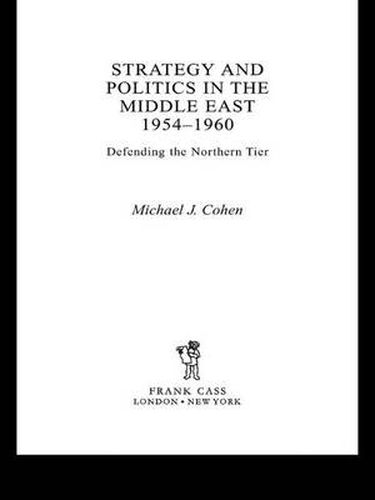Readings Newsletter
Become a Readings Member to make your shopping experience even easier.
Sign in or sign up for free!
You’re not far away from qualifying for FREE standard shipping within Australia
You’ve qualified for FREE standard shipping within Australia
The cart is loading…






The period covered by this book, 1954-60, witnessed a significant change in Allied strategy for the Middle East. Its focus switched from Egypt to the states of the so-called northern tier of the Middle East: Turkey, Iraq, Iran and Pakistan. Allied planning focused now on holding up a future Soviet offensive against the Middle East at the strategic passes that cut through the Zagros mountains, across the Iraqi-Iranian border. This was to be done with the indigenous ground forces of the northern tier states, complemented by Allied strategic and tactical nuclear bombing. In 1955, the Baghdad Pact became the political expression of the new strategy. The economic and strategic interests of the West in the Middle East provide the context for the tumultuous events of this period: the Anglo-Egyptian Agreement of 1954 for the evacuation of Egypt; the formation of the Baghdad Pact in 1955; the Suez Crisis which, together with the escalating Arab-Israeli conflict, erupted into open war in November 1956; and finally, the crises that rocked the Middle East in July 1958: the fall of the Hashemite dynasty and the ancien regime in Iraq, and the British and American military interventio in Jordan and the Lebanon respectively. These last events constituted the final act in a drama that had begun in 1955. They effectively marked the end of the Allies’ ‘northern tier’ strategy. In the spring of 1959 Iraq seceded from the Baghdad Pact, and the rump was renamed the Central Treaty Organisation (CENTO). This book reveals the extent to which the UK clung on to great-power pretensions and used bluff, even deception, in order to give the impression that she disposed of greater military resources than was in fact the case. It describes not only Anglo-American tensions in the Middle East, but also the Americans’ reluctance to take over Britain’s former hegemony in the region. Finally, it reveals the extent to which the Allies’ relationship with Israel was a constant restraint upon their freedom of action in the area, and their ability to forge military alliances with Arab states.
$9.00 standard shipping within Australia
FREE standard shipping within Australia for orders over $100.00
Express & International shipping calculated at checkout
The period covered by this book, 1954-60, witnessed a significant change in Allied strategy for the Middle East. Its focus switched from Egypt to the states of the so-called northern tier of the Middle East: Turkey, Iraq, Iran and Pakistan. Allied planning focused now on holding up a future Soviet offensive against the Middle East at the strategic passes that cut through the Zagros mountains, across the Iraqi-Iranian border. This was to be done with the indigenous ground forces of the northern tier states, complemented by Allied strategic and tactical nuclear bombing. In 1955, the Baghdad Pact became the political expression of the new strategy. The economic and strategic interests of the West in the Middle East provide the context for the tumultuous events of this period: the Anglo-Egyptian Agreement of 1954 for the evacuation of Egypt; the formation of the Baghdad Pact in 1955; the Suez Crisis which, together with the escalating Arab-Israeli conflict, erupted into open war in November 1956; and finally, the crises that rocked the Middle East in July 1958: the fall of the Hashemite dynasty and the ancien regime in Iraq, and the British and American military interventio in Jordan and the Lebanon respectively. These last events constituted the final act in a drama that had begun in 1955. They effectively marked the end of the Allies’ ‘northern tier’ strategy. In the spring of 1959 Iraq seceded from the Baghdad Pact, and the rump was renamed the Central Treaty Organisation (CENTO). This book reveals the extent to which the UK clung on to great-power pretensions and used bluff, even deception, in order to give the impression that she disposed of greater military resources than was in fact the case. It describes not only Anglo-American tensions in the Middle East, but also the Americans’ reluctance to take over Britain’s former hegemony in the region. Finally, it reveals the extent to which the Allies’ relationship with Israel was a constant restraint upon their freedom of action in the area, and their ability to forge military alliances with Arab states.